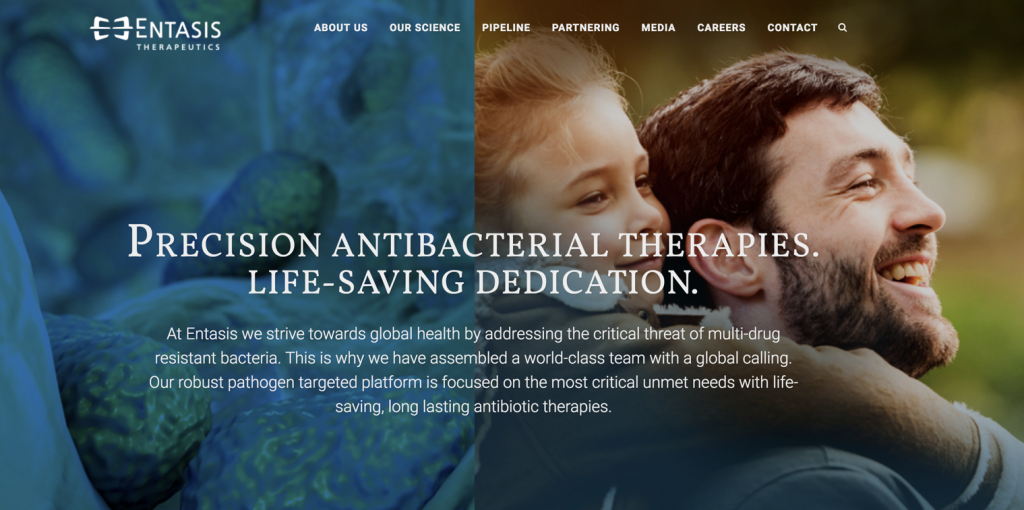



Get new exclusive access to healthcare business reports & breaking news




Privately owned Entasis Therapeutics, a company working on new antibacterial drugs to treat drug-resistant bacterial infections, is going public in order to fund its efforts to push new drugs through clinical trials. The company has filed for an IPO and it’s looking to get up to $86.25 million in funding.
Credit Suisse and BMO Capital Markets, along with SunTrust Robinson Humphrey and Wedbush PacGrow, filed for the IPO. Entasis Therapeutics will be listed under the symbol ETTX.
For the first six months of 2018, the company declared $5M in revenue and a net loss of $16.4M after operating expenses of $23.8M (R&D expenses of $18M).
Antibiotic resistance is a serious threat to patients worldwide prompting the World Health Organization (WHO) to publish its first ever list of the most dangerous bacteria that endanger human life in February 2017.
This list consists of 12 families of dangerous bacteria which are not affected by the drugs commonly used against infections.
Antibiotic resistance takes 700,000 lives each year, and experts are worried that if nothing is done to stop the phenomenon, antibiotic resistance will cause 10 million deaths annually by 2050.
There are three levels of urgency categories on the list – critical, high, and medium. It is no surprise that three of the four bacteria for which Entasis is fighting to find a treatment are on the critical list. These three are: Acinetobacter baumannii, Pseudomonas aeruginosa, Enterobacteriaceae.
All three are resistant to multiple drugs. They can cause pneumonia and blood infections, among other types of infection.
These species are also known as gram-negative bacteria. In simpler words, gram-negative bacteria are those that live in the intestines and have developed two membranes for each cell. This means that drug molecules are unable to get inside the cells and destroy them.
The fourth bacteria on which Entasis Therapeutics is focusing its efforts causes gonorrhea. It is on the list of medium urgency pathogens, along with those causing food poisoning. These bacteria can also be deadly, and have become ever more resistant to drugs.


Based in Waltham, Massachusetts, Entasis Therapeutics was founded in 2015 and operates as a subsidiary of AstraZeneca PLC.
One year after its founding, the company received USD $50 million after a Series B financing round. This was led by Clarus and included Frazier Healthcare Partners, Novo Holdings A/S and Eventide Fund.
In September 2017, the company got an additional USD $31.9 million from Pivotal bioVenture Partners, Sofinnova Ventures and TPG Biotech.
Entasis Therapeutics offers ETX2514, a broad-spectrum inhibitor of class A, C, and D beta-lactamases. The substance is active against Acinetobacter baumannii, a gram-negative bacterium that, as already stated, causes dangerous infections that can lead to death.
Another compound on the Entasis Therapeutics work list is ETX0914, a new oral antibiotic targeting uncomplicated gonorrhea.
The Entasis Therapeutics team of 30 scientists also works on developing antibacterials for treating serious gram-negative infections, such as pneumonia, infections of the blood, urinary tract infections, and post surgery infections.
Entasis Therapeutics Inc. has a strategic development collaboration with Zai Lab Limited (NASDAQ: ZLAB), a Shanghai-based innovative biopharmaceutical company. The two companies announced an exclusive license agreement for ETX2514 in the Asia-Pacific region back in April.
This was not the first time Entasis Therapeutics joined with some other entity in order to gain more strength.
In July 2017, Entasis partnered with Global Antibiotic Research & Development Partnership (GARDP) to develop zoliflodacin, a new first-in-class oral antibiotic and one of the only treatments in development to address drug-resistant gonorrhea.
The partnership enabled the drug to enter pivotal trials.
The announcement came as the World Health Organization (WHO) released alarming new data stating more than 60 percent of the 77 countries surveyed across the world have reported resistance to the last-resort treatment for gonorrhea.
Entasis Therapeutics has signed a licensing agreement to grant access and the responsible use of its antibiotic candidate (zoliflodacin) in late-stage clinical development, that covers 168 countries. It can develop a plan for ensuring appropriate use of the product, on approval, in remaining territories.
On August, 14, Entasis Therapeutics reported positive results from the company’s multinational Phase 2 clinical trial of its ß-lactamase inhibitor, ETX2514, in combination with sulbactam (the combination referred to as ETX2514SUL) in the treatment of complicated urinary tract infections (cUTI), including acute pyelonephritis (kidney infection) in adults.
In this trial, ETX2514SUL, when administered with imipenem/cilastatin (IMI), was generally well tolerated and eradicated pathogens that did not respond to imipenem in 3 out of 3 patients. In the first three months of 2019, Entasis plans to initiate a Phase 3 clinical trial concentrating on carbapenem-resistant Acinetobacter baumannii infections.
The Phase 2 double-blind, randomized, placebo-controlled clinical trial evaluated the safety and efficacy of intravenous (IV) ETX2514SUL in adult patients with complicated urinary tract infections.
Eighty patients randomly received either a dose of ETX2514SUL (ETX2514 1 g plus sulbactam 1 g) or a matching placebo every six hours for seven days, all of them were administered 500mg IV IMI every six hours.
ETX2514SUL plus IMI showed similar microbiological success in the microbiologically evaluable population as placebo plus IMI (80 vs. 81 percent) and both treatment groups achieved 100 percent clinical success in the clinically evaluable population. ETX2514SUL was generally well tolerated. The adverse event profile of ETX2514SUL was similar to that of the placebo with no serious adverse events (SAEs) reported.
If everything else goes as planned with the rest of the clinical trials, 2019 might be the year Entasis will put some products on the market.
This might bring not only hope for those suffering drug-resistant infections, but also a significant ROI for the new shareholders.